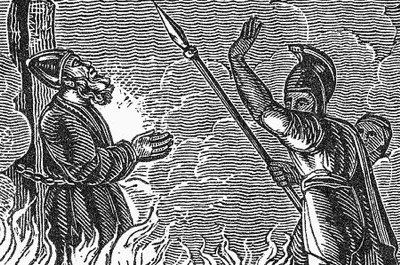
Victory in Death: A Narrative of the Death of Polycarp
The following narrative is an excerpt from a short booklet that I authored, titled ‘Victory in Death.’ Solomon said that it was better to go to the house of mourning than the house of feasting, because the wise will lay it to heart. I republish this story because I believe there is great value in Christians being acquainted with the faith of those who obtained victory in death.
Polycarp was an old man in the year 155 AD. As the bishop of Smyrna in the Roman Empire, he had served Jesus Christ faithfully for many years. But the fires of persecution were raging, and many had already been delivered up to the teeth of wild beasts.
When this godly man heard that he was being hunted, he fled to a small house in the countryside, but soon his pursuers followed him and seized him. Since it was evening time, and Polycarp knew the owner of the house, he asked his host to prepare a meal for the Roman soldiers, and asked his captors to let him pray for an hour as they ate. They agreed to this, but as they listened to him praying fervently to his Lord, many of them felt ashamed to be arresting such a godly man.
They brought Polycarp back into the city, placing him in a chariot. As he neared the city, a Roman ruler met him and rode beside him on the chariot, urging him to worship Caesar; but finding that he could not persuade the prisoner, he threw him off the chariot, dislocating his leg.
Then the prisoner was brought into the stadium, before the consul, who questioned him, arguing that it was only logical to worship Caesar and spare his life.
But Polycarp would not do so; he said, “Eighty and six years have I served Him, and He never did me any injury: how then can I blaspheme my King and my Savior?”
Irritated, the proconsul threatened, “I have wild beasts at hand; I will cast you to these, unless you repent.”
But Polycarp replied, “Call them then, for we are not accustomed to repent of what is good in order to adopt that which is evil.”
Then the Roman threatened him again, “I will cause you to be consumed by fire, seeing you despise the wild beasts, if you will not repent.”
But Polycarp, his face filled with confidence and grace, only replied, “You threaten me with fire which burns for an hour, and after a little is extinguished, but are ignorant of the fire of the coming judgment and of eternal punishment, reserved for the ungodly. But why do you tarry? Bring forth what you will.”
And so it was determined that Polycarp should be burnt alive for the crime of being a Christian. A great pyre of wood was gathered, and Polycarp was led to the stake. As they prepared to nail him to the wood, he said simply, “Leave me as I am; for He that gives me strength to endure the fire, will also enable me, without your securing me by nails, to remain without moving in the pile.”
Then Polycarp cried out to his Lord, “I give Thee thanks that Thou hast counted me worthy of this day and this hour, that I should have a part in the number of Thy martyrs, in the cup of Thy Christ, to the resurrection of eternal life, both of soul and body, through the incorruption imparted by the Holy Ghost.”
Soon the fire was lit, and though it burnt fiercely all around him, it did not come close enough to him to harm him. Seeing this, an executioner approached and pierced him, killing him. Some say, that he bled so much from this wound, that the fire was extinguished by his great hemorrhage of blood. Afterward, his body was placed in the middle of a great bonfire and consumed. And this is the way that the holy and pious Polycarp, whose only crime was to believe in Jesus, was martyred.




your quotes seem very accurate, from where did you read them? Are there original histories of this time and who wrote them?
Hi Trish, thanks for the question! Yes, there are some histories from this time. The ‘Martyrdom of Polycarp’ is an ancient manuscript that provides a detailed account of Polycarp’s death. If you are interested in this story, you may want to check that out! – Daniel